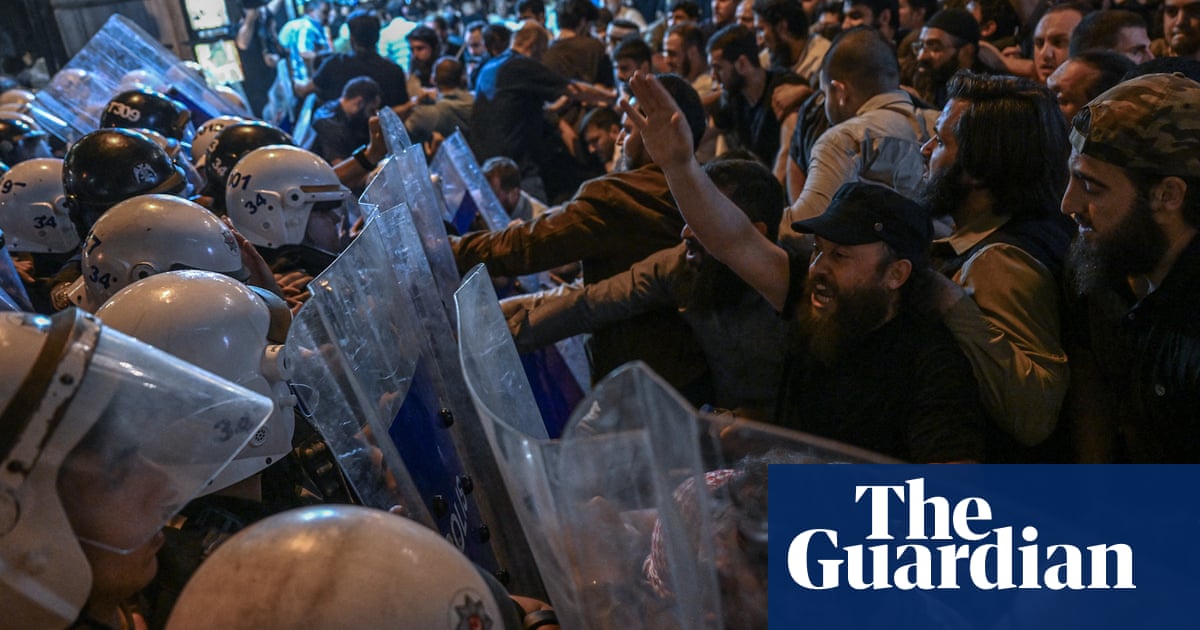Clashes erupted in Istanbul on Monday as police deployed rubber bullets and teargas to disperse crowds following allegations that the satirical magazine LeMan published a cartoon depicting the Prophet Muhammad. The incident has sparked a heated debate about freedom of expression and religious sensitivity in Turkey.
The unrest began after Istanbul’s chief prosecutor ordered the arrest of LeMan’s editors, accusing them of “publicly insulting religious values.” Tuncay Akgun, the magazine’s editor-in-chief, defended the publication, stating that the image had been misinterpreted. “This cartoon is not a caricature of Prophet Muhammad in any way,” Akgun told Agence France-Presse. “In this work, the name of a Muslim who was killed in the bombardments of Israel is fictionalized as Muhammad. More than 200 million people in the Islamic world are named Muhammad.”
As news of the arrest warrants spread, tensions escalated. A group of protesters attacked a bar frequented by LeMan staff in downtown Istanbul, leading to confrontations with police. According to an AFP correspondent, the scuffles quickly grew into clashes involving 250 to 300 people.
Background of LeMan and Its Satirical Legacy
Founded in 1991, LeMan is renowned for its political satire and has often found itself at odds with conservative factions in Turkey. The magazine gained international attention for its support of France’s Charlie Hebdo following the 2015 attack on its Paris offices by Islamist gunmen. The attack, which resulted in the deaths of 12 people, was in retaliation for Charlie Hebdo’s publication of caricatures of the Prophet Muhammad.
This latest incident with LeMan highlights the ongoing tension between freedom of expression and religious respect in Turkey, a country that straddles both European and Middle Eastern cultural influences.
Official Reactions and Legal Implications
Turkey’s Interior Minister, Ali Yerlikaya, confirmed the arrest of the cartoonist responsible for the image, as well as LeMan’s graphic designer. “The person named DP who made this vile drawing has been caught and taken into custody,” Yerlikaya announced. “These shameless individuals will be held accountable before the law.”
In a series of posts on social media platform X, LeMan defended the cartoon, arguing that it had been deliberately misinterpreted. “The cartoonist wanted to portray the righteousness of the oppressed Muslim people by depicting a Muslim killed by Israel,” the magazine stated. “We do not accept the stigma imposed on us because there is no depiction of our prophet.”
“Disrespect towards our beliefs is never acceptable,” stated Justice Minister Yilmaz Tunc. “No freedom grants the right to make the sacred values of a belief the subject of ugly humour.”
Istanbul’s Governor, Davut Gul, also condemned the magazine, accusing it of attempting to provoke societal unrest. “We will not remain silent in the face of any vile act targeting our nation’s faith,” he declared.
Expert Opinions and Historical Context
Experts note that this incident is emblematic of the broader struggle within Turkey over the balance between secularism and religious conservatism. Dr. Ayse Kadioglu, a political scientist specializing in Turkish politics, commented, “Turkey has long been a battleground for these values, and incidents like this highlight the delicate balance the country must maintain.”
Historically, Turkey has been a secular state since the founding of the Republic in 1923, yet religious sentiments remain deeply embedded in its society. The government’s recent actions against LeMan may reflect a shift towards prioritizing religious values over secular freedoms, a trend observed in other recent policies.
Looking Ahead: Implications for Freedom of Expression
The arrests and subsequent clashes underscore the challenges facing media outlets in Turkey, where press freedoms have been increasingly restricted. The situation raises questions about the future of satirical journalism in a country where the line between free speech and religious respect is often contested.
As the legal proceedings against LeMan’s staff unfold, the international community will be watching closely. The outcome could have significant implications for freedom of expression in Turkey and potentially influence similar debates in other parts of the world.
For now, the situation remains tense, with authorities emphasizing the importance of maintaining public order while media advocates call for the protection of journalistic freedoms. The coming weeks will likely see further developments as both sides navigate this complex and sensitive issue.
